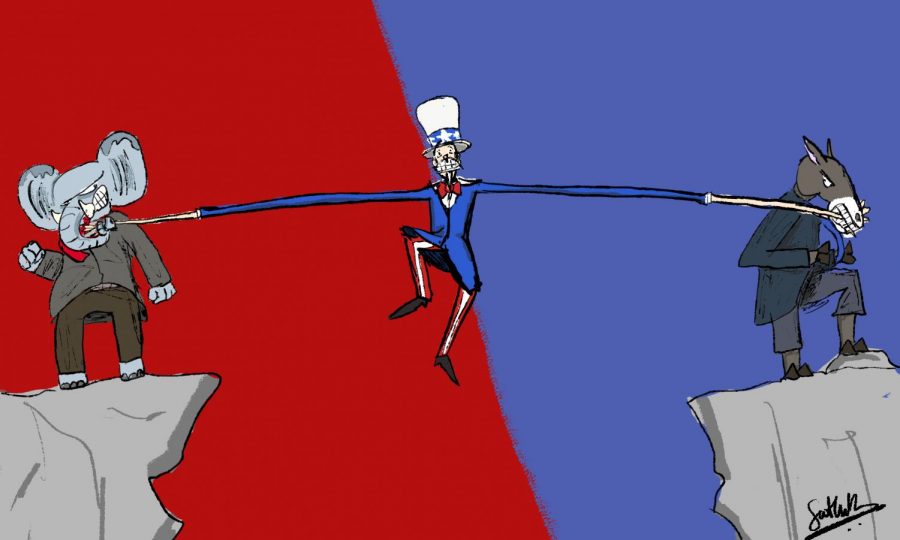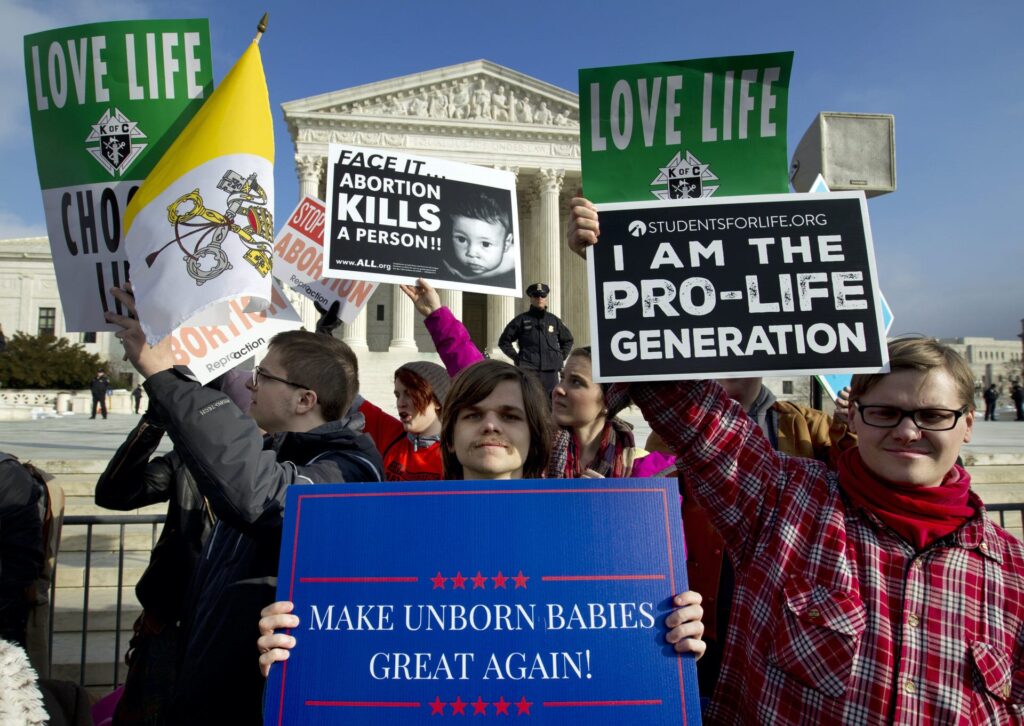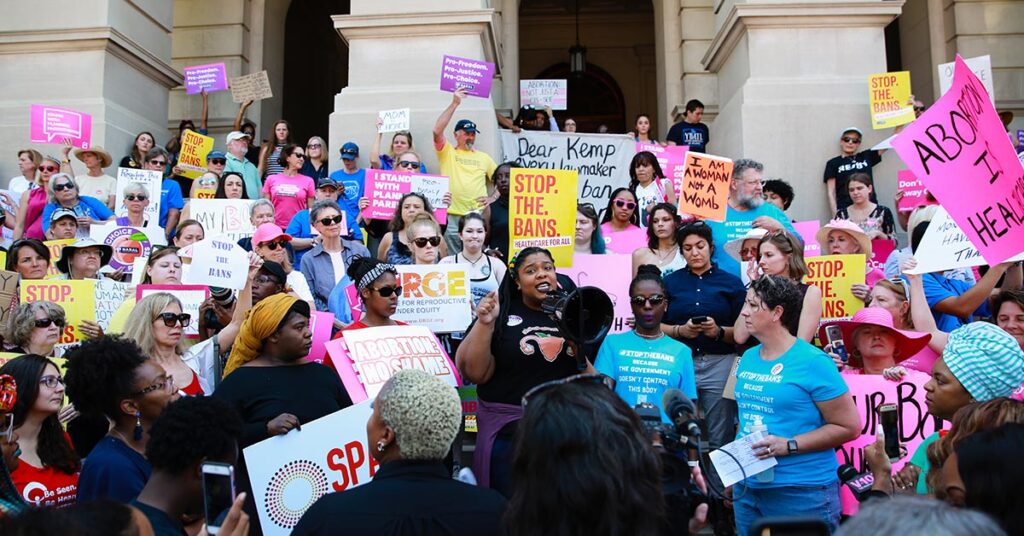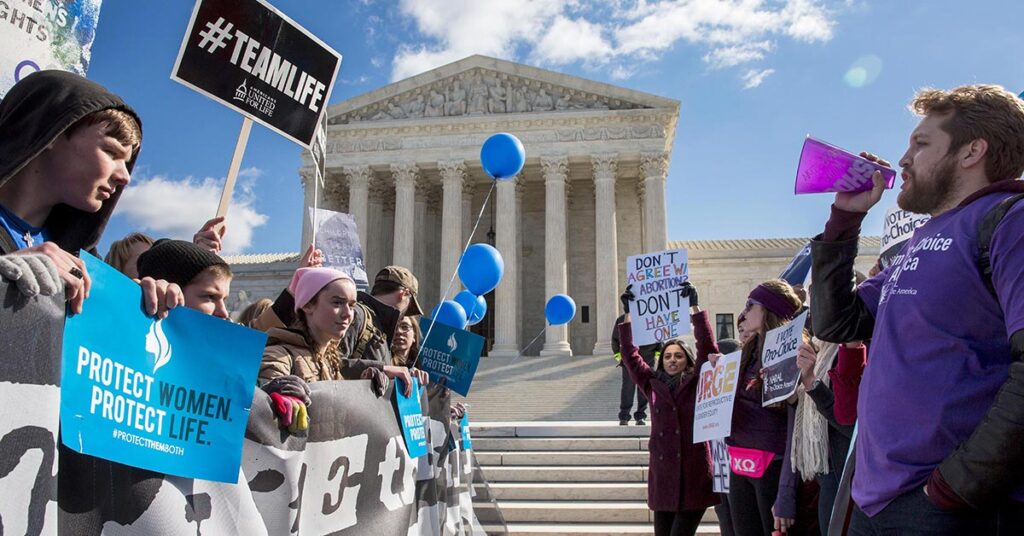
What is Political Polarization? And what effect has it had on Politics in the United States?
Political polarization refers to the increasing ideological divide between individuals or groups within a society, where individuals or groups become more ideologically distant from each other, leading to a breakdown in social cohesion and compromise. It is a process where people move towards more extreme and ideologically pure positions on political and social issues, leading to a lack of agreement and understanding between people who hold differing viewpoints. In the United States, political polarization has been a significant factor in shaping.
the country’s political landscape over the past 30 years. The polarization is primarily driven by differences in political ideologies, such as liberal and conservative beliefs, and social issues, such as race, religion, gender, and sexuality. [1]One of the most significant consequences of political polarization in the United States is the inability of political parties to work together to pass meaningful legislation. [1]As political parties become more polarized, there is a reduction in the number of policies on which they can agree, and it becomes harder to find common ground. This has led to a gridlock in Congress and a lack of progress on important issues, such as healthcare, immigration, and climate change. Another consequence of political polarization is the rise of hyper-partisanship, where individuals or groups become more loyal to their party than to their country. [2]This has resulted in a decline in trust in government institutions and a rise in conspiracy theories and fake news. It has also led to increased hostility and intolerance towards people who hold different political views, leading to a rise in political violence and protests. Furthermore, political polarization has led to a lack of diversity in political media, where people consume only news and opinions that reinforce their existing beliefs. [2]This has resulted in a “filter bubble,” where people are less likely to engage in critical thinking and challenge their beliefs. This, in turn, leads to a further entrenchment of political polarization, as people become more isolated and less likely to engage with people who hold different opinions.
What is Pro-Life?
The pro-life movement is a political and social movement dedicated to protecting human life, especially fetal life. The movement is based on the belief that life begins at conception and therefore every human life, including the unborn child, has the right to be protected and preserved. [3]The pro-life movement argues that abortion is morally wrong and should be illegal. I believe that the situation is a gross violation of human dignity. They further argue that fetuses are defenseless, vulnerable and innocent human beings, and therefore deserve the same legal protection as other human beings. Some argue that the legalization of abortion has created a culture of death, treating fetal life as expendable and devaluing human life. They believe that the availability of abortion has led to a loss of respect for life and a breakdown of traditional moral values and social norms. [3]Additionally, pro-life advocates argue that there are alternatives to abortion, including: B. Adoption can be a viable solution for women facing unwanted pregnancies. They claim to provide support to women and families. For example, access to health care, childcare and financial assistance can help reduce demand for abortion. Often associated with conservative and religious beliefs, the pro-life movement has been a key issue in American politics for decades. [3]Pro-life advocates have helped advance laws and policies that limit access to abortion. B. Mandatory Waiting Periods, Parental Consent Laws, and Midnight Abortion Restrictions. They have also elected politicians who share their views on abortion and have worked to influence the Supreme Court’s constitutional interpretation of abortion.

What is Pro-Choice?
[4]The Pro-Choice Movement is a political and social movement that defends the right of women to continue or terminate pregnancies. The movement is based on the belief that women have the right to make decisions about their bodies, including reproductive health. Proponents of pro-choice argue that access to safe and legal abortion is essential to women’s health, well-being, and autonomy. They argue that women should have the right to decide whether and when to have children, and that the government should not intervene in these decisions. We believe that refusing to have an abortion can lead to unsafe and illegal abortions, which can result in serious health consequences, including death. They further argue that the decision to continue or abort a pregnancy is a personal and private matter that should be left to individual women and their healthcare providers. They argue that it is not the government’s job to decide what cannot be done. Pro-choice supporters also believe that abortion is a matter of social justice and equity. [4]It argues that safe and legal access to abortion for marginalized women is essential to achieving full economic and social equality. Abortion advocates argue that restricting access to abortion disproportionately harms already disadvantaged women. [4]Often associated with progressive and feminist beliefs, the pro-choice movement has been a key issue in American politics for decades. She has worked to advance laws and policies that protect women’s reproductive rights, including education and safe and legal abortion.

How Has Political Polarization influenced Opinions on Pro-life vs. Pro-Choice?
Political polarization has greatly influenced views on the pro-life vs. pro-choice issue. In recent decades, political parties in the United States have become increasingly polarized on reproductive rights issues, with Republicans generally aligned with the pro-life movement and Democrats aligned with the pro-choice movement. This polarization has created deep divisions in public opinion on abortion and other reproductive rights issues. [5]For example, a 2020 Pew Research Center poll found that 61% of Democrats believe abortion should be legal in all or most cases, while 77% of Republicans believe it should be legal in all or most cases. should be illegal. Political polarization has also influenced the way reproductive rights issues are formulated and publicly discussed. Abortion advocates often argue that abortion is a moral issue at the heart of their beliefs, whereas choice advocates argue that women’s right to choose and access health care Furthermore, political polarization makes it difficult for politicians to find common ground on issues related to reproductive rights, leading to legislative deadlocks. [6]For example, political polarization has hampered parliamentary efforts to pass broad legislation to protect or limit access to abortion. Overall, political polarization has greatly influenced views on the pro-life vs. pro-choice issue in the United States. [5]A widening rift between the two political parties over issues related to reproductive rights has created a deep division in public opinion, making it difficult for politicians to pass comprehensive legislation to address these issues.

How did Political Polarization Influence Roe vs. Wade?
The political polarization in the survivalist vs. alternative debate was a landmark Roe v. Wade decision in the 1973 Supreme Court. [7]In this case, the court ruled that a woman’s right to privacy under the 14th Amendment includes the right to choose an abortion. This decision was highly controversial at the time and continues to this day. Abortion rights advocates, often referred to as “pro-choice,” argue that women should be in control of their bodies and have the right to make their own reproductive choices, including choosing to have an abortion.Roe showing v. Wade as a decisive victory for women’s rights and reproductive freedom. [7]Anti-abortion opponents, often called “life advocates,” argue that life begins at conception and that abortion is tantamount to murder. Showing Roe v. Wade as a moral and legal farce, they have worked to overturn the decision ever since it was made. Over the years, the abortion debate has become increasingly polarized. With many political candidates making abortion a central issue in their campaigns, the issue has become a litmus test for many voters. As a result, the abortion debate is deeply entwined with American politics, and the political polarization around the issue shows no signs of abating.

Why Does This All Matter?
Overall, the polarizing nature of this case boosted the universal memory of it being so divided. It is very difficult to tell whether people actually agree with the ideals put forward on both sides, or if they are just trying to stay loyal to a party. Due to this case, people have very little memory of their being liberal Republicans or conservative Democrats. On the other hand, there are also positive factors that help preserve this memory. Polarization in this particular case helps keep the memory of the protest and related protests alive. The protests and riots might not have happened if this incident had not been politically polarized. Ultimately, political polarization helps keep the memory of Roe v. Wade alive, but it kills the memory that political beliefs are on one spectrum rather than two opposite sides.
By: Mekhi Ashford
Work Cited
[1] Lee, F. (2015). How Party Polarization Affects Governance. Annual Review of Political Science, 18(261–282). https://doi.org/https://doi.org/10.1146/annurev-polisci-072012-113747
[2] Westfall, J., Boven, L., Chambers, J., & Judd, C. (n.d.). Perceiving Political Polarization in the United States: Party Identity Strength and Attitude Extremity Exacerbate the Perceived Partisan Divide. https://doi.org/DOI: 10.1177/1745691615569849 pps.sagepub.com
[3]Lee, P. (2004). The Pro-Life Argument from Substantial Identity: A Defence. Bioethics, 18(3), 249–263. https://doi.org/ https://doi.org/10.1111/j.1467-8519.2004.00393.x
[4] Kimala Price; What Is Reproductive Justice?: How Women of Color Activists Are Redefining the Pro-Choice Paradigm. Meridians 1 December 2020; 19 (S1): 340–362. doi:
[5] Lopez, R. (n.d.). Perspectives on Abortion: Pro-Choice, Pro-Life, and What Lies in between . European Journal of Social Sciences, 27(4), 511–517. http://www.europeanjournalofsocialsciences.com
[6] CRAWLEY, S. L., WILLMAN, R. K., CLARK, L., & WALSH, C. (2009). Making Women the Subjects of the Abortion Debate: A Class Exercise that Moves Beyond “Pro-Choice” and “Pro-Life.” Feminist Teacher, 19(3), 227–240. http://www.jstor.org/stable/40546102
[7]Ziegler, M. (2014). Beyond backlash: legal history, polarization, and roe v. wade. Washington and Lee Law Review, 71(2), 969-1024.
Polarization truly is one of the defining aspects of the United State’s relationship with abortion. The issue used to be one in ambiguous moral limbo: ignored, partially illegal, unregulated. Then, during the 20th century, the discussion became less of an earnest debate and more of a brutal brawl along party lines. It’s very interesting how even something as contentious as abortion can be so easily split along party lines. It makes me wonder how much party affiliation actually determines people’s stance on abortion rather than vice versa.
As you noted, abortion is also a topic absolutely central to the american divide. I wonder how, if it ever is, the debate will be settled. Would it necessitate the collapse of the American political duopoly for the debate to subside?
I wrote about a similar topic in my article as well. Polarization plays a huge role in American politics and when it comes to abortion there is no shortage of controversy and divide. One thing that I think is important to mention is the affects of polarization and how individuals within the United States have been affected because of it.
In my article, I spoke about the various different positions that states have taken on the issue and how individuals across the United States have to follow different rules based on what state they live in. I think it is extremely interesting that the United States provides autonomy to the states because within a particular state you will find people with a multitude of different values and beliefs, however, most states will tend to lean one way when it comes to abortion policies based on their political party affiliation.
I discussed the intentional polarization of abortion by Evangelical Christians, bolstered by Reagan’s presidency. This paper leads me to wonder whether polarization benefits politicians in any real way. We have seen increased polarization within a political party for the first time in recent memory, with the emergence of a pro-Trump camp in the Conservative party. This has led to a slight but significant loss of internal cohesion, resulting in lower voter turnout as some Trump voters would not vote for anyone but Trump and some anti-Trump Republicans would not vote for him even if he were the Republican candidate. Despite this fracturing of the Republican party, Democrats have made relatively few major legislative reforms. If polarization truly benefits nobody, as it appears to, I wonder if it is an inevitable consequence of the structure of our legislature, or if there is some other explanation for its increased prevalence over the last few decades of American politics.
Your article really accurately conveys how abortion debates have both been drawn into and inflamed by an increasingly polarized political climate, and played a role in helping to further this trend. In reality, abortion is a morally complex issue that has been simplfied into a two sided argument for political use. This detracts from any possibility for positive change as having a hold on such a powerfully motivating topic is a strong tool for those hoping to gain influence. Because abortion is such an emotionally charged and deeply felt subject, in most people mind’s it is a topic with very little room for compromise. Compromise is a vital component of a functional democratic society and increasing polarization is eroding the social cohesion necessary for it to succeed.
This is probably an essential subtopic of the abortion debate. In fact, I would say that abortion is the polarizing issue par excellence. Depending on how you look at it, it is literally a life and death issue, at least that is the framing that the pro-life movement uses, as you note in your post. The party divide on this is particularly interesting. It could easily be an issue for a lot of single issue voters and a purity test for candidates when people are deciding who to vote for. Of course, all of this, as you mention, leads to a deadlock in government and there’s a change no meaningful legislation one way or the other can make it through. So, this is likely why so much of politics is rhetoric.
I think this post is incredibly valuable as we continue to shape the collective memory around Roe. The polarization of our democratic society has become increasingly influential in all facets of politics. Using abortion and taking a hard stance on Roe v. Wade has been an increasingly popular tactic for politicians looking to garner support from voters. I think this above all has damaged the true importance of the case. As you stated this is what kills the memory and shapes it more as an incredibly divisive issue that has more to do with the party you support and less to do with the women being affected. Your article draws attention to this divide that has been created by polarization in a way that is informative and inspires thought.